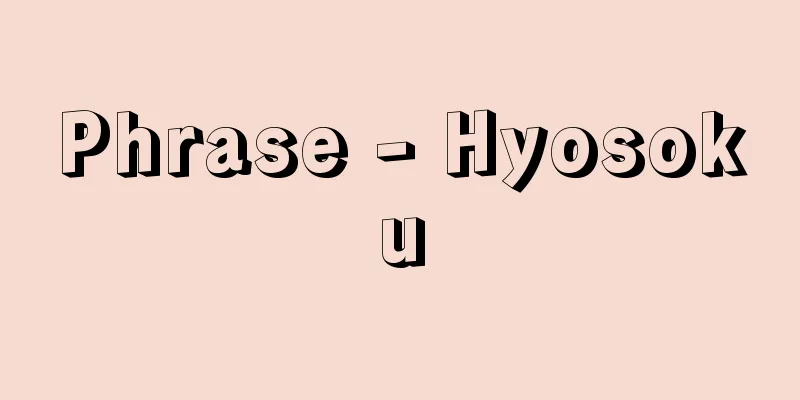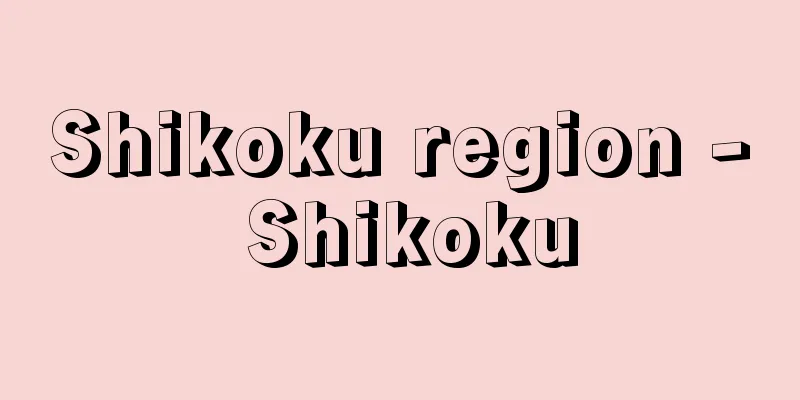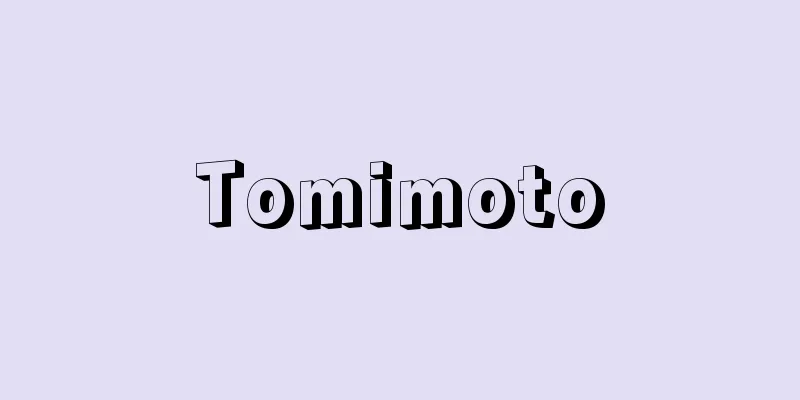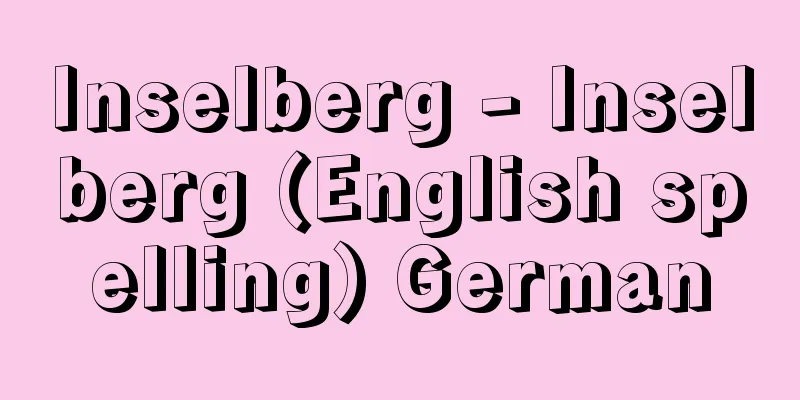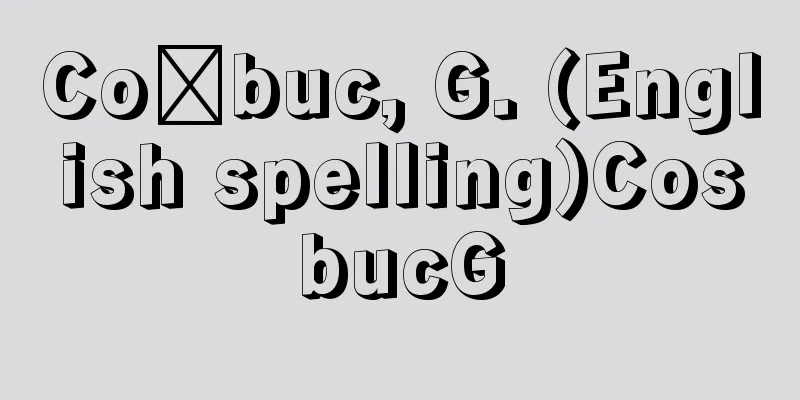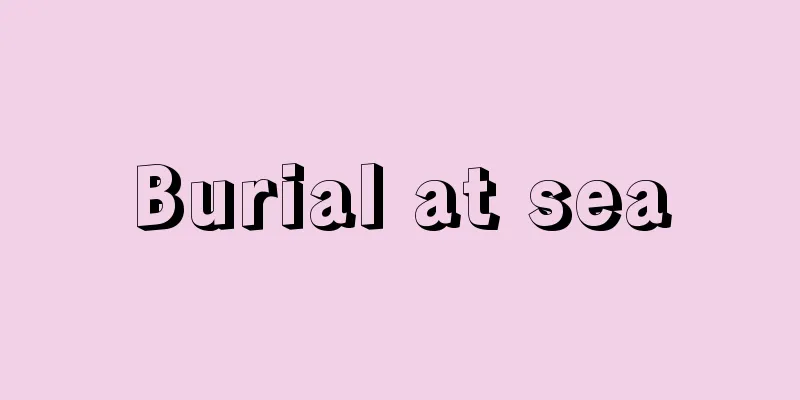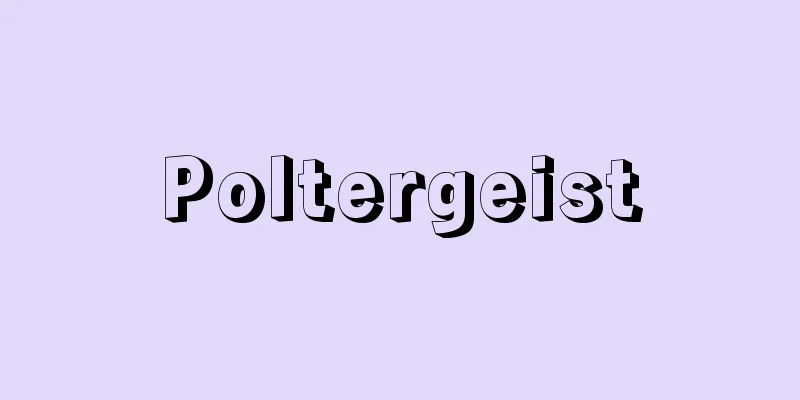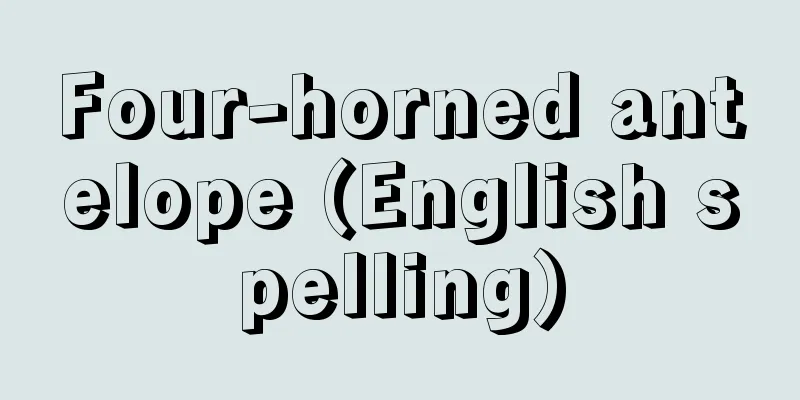Freedom - jiyuu (English spelling) liberty
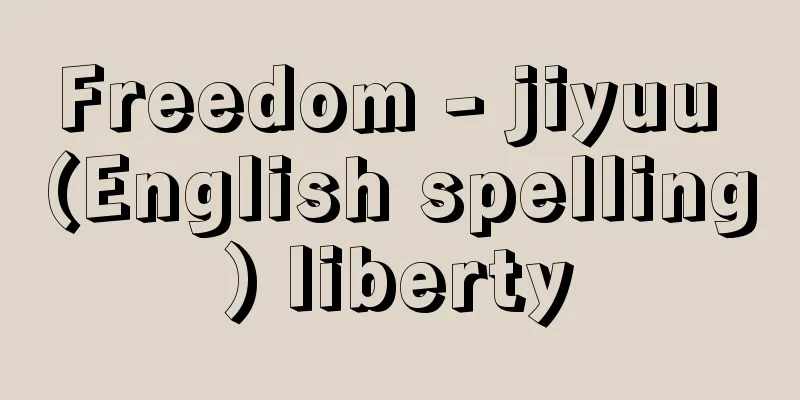
|
Freedom, first of all, means being able to act freely without being forced or restrained. The freedom to go on a trip and enjoy freedom is "freedom from...", but this also applies to animals and things, for example, we say that a caged bird is unfree, and poetry that is not bound by rhythm is called free verse. The Constitution guarantees individual freedom in various matters, but this can also be seen as freedom from force and restraint in the sense that it excludes unjust interference from the state or other people in such matters. However, freedom also has another meaning, not the negative "freedom from...", but the positive "freedom to...". In philosophy, this is called the freedom of choice or decision, and this freedom has been discussed since ancient times as a problem of free will. However, we will deal with "free will" in a separate article. For example, Scheler (1874-1928) argued that while the behavior of animals is determined primarily by the structure of their environmental world, humans, on the other hand, can act infinitely and openly on the world, and that this is where humans' unique spontaneous freedom can be found. Also, according to Nikolai Hartmann (1882-1950), humans are also restricted by the circumstances in which they find themselves, and to that extent humans are not completely free. However, circumstances do not determine humans to act in a certain way, but rather force them to make choices and decisions regarding certain actions. In other words, humans are forced to make decisions, but making decisions is also a form of freedom. Hartmann therefore believed that freedom of choice and decision could be compatible with the constraints and restraints of the situation. Although the perspective is different, the idea of freedom within a situation is also found in Sartre. According to Sartre, humans must freely create their own existence in each situation, moment by moment. In other words, freedom exists only in situations, and situations exist only through freedom. According to Jaspers, who sees freedom of choice and decision as freedom toward one's true self, the fundamental and existential freedom of humans lies in each human being's determination to be himself in his or her existence. "In the determination I experience freedom, and in this freedom the separation of choice and the ego is impossible, and I myself am this freedom of choice." Marxism preaches freedom and liberation from alienation, but even in this case, it can be said that at its root is freedom toward true humans, which aims to develop all of their abilities. [Yoshiaki Utsunomiya] Freedom in Political ScienceThe most basic condition for humans to live a humane life is to be free from any constraints, mental or physical. Therefore, as Hobbes states, freedom can be defined first and foremost as the "absence of constraints." If freedom is restricted or violated, humans can never be said to be in a happy state. The idea that freedom is important for human survival existed in the Greek and Roman eras, but it was only in modern times that humans were able to truly attain freedom. That is, during the civil revolution of the 17th and 18th centuries, Hobbes, Locke, Rousseau and others proposed the creation of a political society that would ensure human freedom, on the basis that humans are born free and equal. Since then, people have come to recognize the importance of freedom. For this reason, modern democracies guarantee various human freedoms in their constitutions. For example, "freedom of speech and thought" and "freedom of religion" are extremely important to humans, so even state power cannot restrict or infringe on these freedoms, and they are guaranteed in the constitution as rights. In addition, arresting or detaining a person, that is, restraining a person's body and depriving them of their freedom, must be done carefully, so the constitution guarantees these rights as "personal (bodily) freedom." Furthermore, if state power or other people were to take away the property that people have built up through their labor, social stability would not be maintained. For this reason, the constitution includes a provision on "guarantee of property rights." This allows people to freely dispose of and use the fruits of their labor and live comfortable and safe lives. In the constitution, the various freedoms mentioned above are called "liberal rights" ("liberal fundamental rights"), and these freedoms are also called "freedom from power," as they cannot be infringed even by state power. However, the freedoms mentioned above are also at risk of being violated if a tyrant or dictator comes along. Therefore, in order to prevent such danger, it is necessary for the people living in a political society to elect their representatives and governments of their own volition and protect their freedoms and rights. For this reason, constitutions guarantee people the "right to participate in politics," or "political freedom." These rights are also called "suffrage," and by exercising this suffrage to elect representatives who can truly express the will of the people, people can have them make laws and conduct politics that realize the interests of all members, thereby guaranteeing people's freedom and even acquiring new freedoms. In this sense, political freedom and political rights can be said to be extremely important for humans to live freely and comfortably. These rights and freedoms were gradually established in the constitutions of various countries from the 1930s to the middle of the 20th century as a reinforcement of "liberal rights." When considering freedom, we must not overlook its relationship with equality. The fact that the slogan "Liberty, Equality, Fraternity" was raised as the banner of the French Revolution speaks volumes about this. However, as the capitalist economy subsequently developed and became more sophisticated, wealth became concentrated in the hands of a few, and as depressions and recessions occurred cyclically, the majority of people suffered from unemployment, poverty, and other adverse conditions, and the issue of providing relief to the economically and socially disadvantaged became an urgent task for capitalist nations. Socialists such as Marx and Engels argued that human freedom cannot be truly established without abolishing the private property system in which the few organize the many to produce and monopolize the profits and fruits of production, and replacing it with an economic system in which the fruits of production are shared socially to achieve human equality. If the majority of people are forced to live in poverty and in an unstable state, the comfortable, safe, and humane life that freedom originally aims for cannot be guaranteed. Thus, after World War II, a dozen socialist countries emerged on this earth, in addition to the Soviet Union (although the Eastern European countries and the Soviet Union ceased to be socialist countries after the "Declaration of the End of the Cold War" in 1989), and these countries built their nations based on the socialism advocated by Marx and Engels, and their constitutions are characterized by the inclusion of many provisions, especially those related to equality, in addition to provisions for freedom and suffrage. In contrast, capitalist countries do not change their economic systems, but instead aim to achieve political and economic stability by correcting their defects and achieving a balance between freedom and equality. These countries are now known as "welfare states." So how did these countries transform the idea of modern freedom and embark on the path to a "welfare state"? The ideas of Thomas Hill Green (1836-82), a British philosopher active from the mid-19th century to the end of the 19th century, are important in this regard. At that time in Britain, the gap between rich and poor was widening, and the working class was in a miserable state. There was a strong desire for the state and government to take proactive measures to help the weak. In that case, there was discussion of imposing progressive taxes on high-income earners and using the tax revenue to establish public schools and implement various social security policies. However, there were various objections, mainly from the wealthy, to such measures, such as that they would unduly restrict individual property rights, an important pillar of freedom, and that government intervention in economic activity was contrary to traditional laissez-faire. Green stated that in this situation, the most important thing for humans is "personal growth," and that freedom is a means to achieve this. "Personal growth" essentially means "people living like humans." However, in today's society, by making freedom the goal, the freedom of many people is actually being hindered. However, because ends take precedence over means, Green proposed that in order to realize "personal growth," it is unavoidable that "freedom" be restricted. This "Columbus' egg"-like shift in the concept of "freedom" led to a major step forward in British politics in the direction of a welfare state. For this reason, the constitutions of many countries today include provisions related to "social rights" ("fundamental social rights"), which recognize that some degree of restriction of individual freedom is unavoidable for the sake of society and the public interest. The first constitution to stipulate this idea of social rights was the 1919 "Weimar Constitution." For example, it stipulates that "the order of economic life must conform to principles of justice, the purpose of which is to guarantee for all people a life worthy of human beings. Within these limits, individual economic freedom must be ensured" (Article 151, paragraph 1), and then goes on to state that "ownership entails obligations. The exercise of these rights should at the same time contribute to the public welfare" (Article 151, paragraph 3). In addition, Article 29 of the Japanese Constitution, "Guarantee of Property Rights," stipulates that the guarantee of property rights (freedom rights) is parallel to the provision of restrictions for the public welfare (social rights). Therefore, in modern nations, it can be said that "freedom" and "equality" are inseparably linked. [Hiroshi Tanaka] "Freedom in the Modern State" by H.J. Laski, translated by Yoshiaki Iisaka (1950, Iwanami Shoten) " ▽ "Flight from Freedom" by E. Fromm, translated by Rokuro Hidaka (1951, Tokyo Sogensha) ▽ "The State and the Individual" by Hiroshi Tanaka (1990, Iwanami Shoten)" [Reference] |Source: Shogakukan Encyclopedia Nipponica About Encyclopedia Nipponica Information | Legend |
|
自由とはまず第一に、強制や束縛を受けずに気ままにふるまえることを意味する。旅に出て自由を味わうといった場合の自由は、こうした「……からの自由」であるが、これは動物や事柄にも適用され、たとえば籠(かご)の鳥は不自由だといったり、韻律に束縛されない詩を自由詩とよんだりする。憲法では、さまざまな事柄に関して個人の自由が保障されているが、これもそうした事柄に関して国家や他人からの不当な干渉を排除するという意味では、強制、束縛からの自由とみることができる。 だが自由には、もう一つ、消極的な「……からの自由」ではなくて、積極的な「……への自由」という意味もある。哲学において選択や決断の自由とよばれるもので、古来この自由は自由意志の問題として論議されてきた。だが「自由意志」については別項で扱うとして、ここで選択や決断の自由を環境や状況との関連でとらえる哲学説に触れると、たとえばシェーラー(1874―1928)は、動物の行動はその環境世界の体制によって一義的に決定されているが、人間は逆に世界に対して無限に公開的に働きかけることができ、ここに人間に独特な自発的自由がみいだされるとする。またニコライ・ハルトマン(1882―1950)によると、人間もまた彼が位置するそのつどの状況によって制約されており、その限りでは人間はまったくの自由ではない。とはいえ、状況は人間をある一つの行為へと決定するのではなく、あれやこれやといった特定のいくつかの行為に関してその選択、決断を強いる。つまり人間は決断へと強制されているが、決断もまた一つの自由である。ハルトマンは、そこで、選択、決断の自由は状況による束縛、拘束と両立しうると考えた。 視点は異なるが、状況内での自由という考えは、サルトルにもみいだされる。サルトルによると、人間はそのつどの状況において時々刻々自らの実存を自由に創造していかなければならない。つまり自由は状況のうちにのみ存し、また状況は自由によってのみ存在する。また選択、決断の自由を本来の自己への自由とみるヤスパースによると、人間の根源的にして実存的な自由は、人間各自がその現存在において自己自身であろうと決意することのうちに存する。「決意のうちで私は自由を経験し、この自由のうちでは選択と自我との分離は不可能であって、私自身がこの選択の自由である」という。なおマルクス主義は人間の疎外からの自由と解放を説くが、その場合にもその根本には人間の全能力の開花を目ざした本来的人間への自由が置かれているといえよう。 [宇都宮芳明] 政治学における自由人間が人間らしく生きていくうえでもっとも基本的な条件は、精神的にも身体的にもいかなるものからも拘束を受けないということである。したがって、自由とはホッブズも述べているようにまず第一にこの「拘束の欠如」と定義づけることができよう。そして、自由が制限されたり侵害されたりすれば、人間はけっして幸福な状態にあるとはいえないのである。 自由が、人間の生存にとって重要であるという考えはギリシア・ローマの時代にもあったが、人間が真に自由を獲得できたのは近代に入ってからである。すなわち、17、18世紀の市民革命期に、ホッブズ、ロック、ルソーなどが、人間は生来、自由で平等な存在であるとして、人間の自由を確保できるような政治社会をつくるように提案して以来、自由の重要性が人々の間で認識されるようになった。 このため近代民主主義国家においては、憲法上、さまざまな人間の自由を保障している。たとえば、「言論・思想の自由」とか「宗教の自由」とかは人間にとってきわめて重要なものであるから、国家権力といえども、それらの自由を制限したり侵害したりできない権利であるとして憲法において保障している。また人を逮捕したり拘禁したりする、つまり人の身体を拘束して自由を奪うような場合には慎重に行われなければならないから、憲法では、「人身(身体)の自由」としてこれらの権利を保障している。さらに、人が労働して形成した財産を国家権力や他人が奪うようなことがあっては社会の安定性は保たれない。憲法において「財産権の保障」という規定が設けられているのはこのためである。これによって人は、自分の労働の成果を自由に処理したり利用したりして快適で安全な生活を送ることができるのである。憲法では、以上に述べたさまざまな自由を「自由権」(「自由権的基本権」)と名づけ、国家権力といえども侵害できない自由として、これらの自由のことを「権力からの自由」ともよんでいる。 ところで、以上に述べた自由も、専制者や独裁者が現れると侵害される危険性がある。そこで、そうした危険性を防止するためには、政治社会に住んでいる人々が自分たちの意志で代表者や政府を選出し自由や権利を守る必要がある。そのため憲法では、人々に「政治に参加する権利」つまり「政治的自由」を保障している。これらの権利は「参政権」ともよばれるが、人々は、この参政権を行使して真に国民の意志を表明できる代表者を選び、彼らに全成員の利益を実現するような法律をつくらせたり、政治を行わせることによって、人々の自由を保障し、そればかりか、新しい自由さえも獲得しようとするのである。この意味で、政治的自由・政治的権利は、人間が自由で快適に生活していくうえできわめて重要なものであるといえよう。そして、このような権利・自由は、「自由権」を補強するものとして、19世紀の30年代から20世紀の中ごろにかけてしだいに各国憲法において確立されてきたのである。 ここで、自由を考えていくうえで見落としてならないものは平等との関係である。フランス革命の旗印に「自由・平等・博愛」というスローガンが掲げられたのはなによりもそのことを物語っている。ところがその後、資本主義経済が発展し高度化していく過程で、少数者に富が集中し、また恐慌や不景気が周期的に繰り返されるなかで、大多数の者が失業・貧困などの悪条件に苦しめられ、ここに経済的・社会的弱者の救済という問題が資本主義国家にとって緊急の課題となった。 マルクスやエンゲルスのような社会主義者たちは、少数者が多数者を組織して生産させ、その利潤や果実を独占的に所有する私有財産制を廃絶し、生産の果実を社会的に共有する経済制度に変えて人間の平等を達成することなしには、人間の自由を真に確立することにはならないと主張した。大多数の者が貧困な状態に置かれ、不安定な生活を強いられていては、本来、自由が目的にしている快適で安全な人間らしい生活は保障されないからである。こうして、第二次世界大戦後、ソ連のほかに、十数か国の社会主義国家がこの地球上に出現したが(もっとも1989年の「冷戦終結宣言」以降、東欧諸国やソ連が社会主義国であることをやめたが)、これらの国々は、マルクスやエンゲルスの唱えた社会主義によってその国づくりを行い、それぞれの憲法においては、自由権や参政権の規定のほかに、とくに平等に関する規定が多数盛り込まれているのが特色といえよう。 これに対し資本主義国家においては、経済制度は変更しないが、その欠陥を修正しつつ自由と平等のバランスを図りながら政治的・経済的安定を実現する方向をとっている。そしてこれらの国々は今日「福祉国家」とよばれている。 では、これらの国々においては、近代的自由の考えをどのように転換させて「福祉国家」への道を歩むことになったのだろうか。これについては、19世紀中葉から末にかけて活躍したイギリスの哲学者トマス・ヒル・グリーン(1836―82)の思想が重要である。当時イギリスでも貧富の差が拡大し、労働者階級は悲惨な状態に置かれていた。そこで弱者救済のために国家や政府が積極的な施策をとることが強く望まれた。その場合、高額所得者に累進税をかけ、それを財源として公立学校を設けたり、さまざまな社会保障政策をとることなどが論議された。しかし、そのような措置は、自由の重要な柱である個人の財産権を不当に制限するものであるとか、政府が経済活動に介入するのは伝統的な自由放任主義に反するものであるとか、主として有産者の側からさまざまな反対論があった。 グリーンはこうした状況において、人間にとってもっとも重要なことは「人格の成長」にあるとし、自由はそのための手段である、と述べた。「人格の成長」とは要するに「人間が人間らしく生きる」、ということである。ところが、今日の社会では、自由を目的とすることによって、かえって多くの人々の自由が阻害されている。しかし、目的は手段に優先するから、「人格の成長」を実現するためには、「自由」が制限されることもやむをえない、というのがグリーンの提言であった。このグリーンの「コロンブスの卵」的な「自由」の観念の転換によって、以後、イギリスの政治は福祉国家の方向へと大きく前進した。 今日、世界の国々の憲法において、社会や公共の利益のためには個人自由の制限もある程度やむなしとする「社会権」(「社会権的基本権」)的規定が盛り込まれているのはそのためである。そして、こうした社会権的考え方を最初に規定した憲法は1919年の「ワイマール憲法」であった。そこでは、たとえば、「経済生活の秩序は、すべての者に人間たるに値する生活を保障する目的をもつ正義の原則に適合しなければならない。この限界内で、個人の経済的自由は、確保されなければならない」(151条1項)、続いて「所有権は義務を伴う。その行使は、同時に公共の福祉に役だつべきである」(同条3項)と規定されている。また日本国憲法第29条「財産権の保障」においても、財産権の保障(自由権)と同時に公共福祉による制限(社会権)の規定が並列されている。したがって、現代国家においては、「自由」と「平等」は離れがたく結び付いているといえよう。 [田中 浩] 『H・J・ラスキ著、飯坂良明訳『近代国家における自由』(1950・岩波書店)』▽『E・フロム著、日高六郎訳『自由からの逃走』(1951・東京創元社)』▽『田中浩著『国家と個人』(1990・岩波書店)』 [参照項目] |出典 小学館 日本大百科全書(ニッポニカ)日本大百科全書(ニッポニカ)について 情報 | 凡例 |
>>: Ugly - Ugly (English spelling)
Recommend
Tool steels
A general term for hard steel used as a material ...
Sanin region - Saninchiho
It refers to the area along the Sea of Japan co...
Hunza (English spelling)
The name of a region centered on the Hunza Valley ...
Havas (News Agency) - Abas (English spelling)
The predecessor of France's AFP news agency. ...
Akka Cave - Akkado
This limestone cave is located in Yasuie, Iwaizum...
Stribog
… [Origin of the Gods] The Primary Chronicle (als...
Labor turnover
This refers to the movement of people who are the...
Akazawa Copper Mine
…Since the completion of the Joban Line (then the...
human rights
… [History of human rights in Japan] The terms &q...
Bee larvae (bee larvae) - Hachi no Ko
The term refers to wasp larvae, but also refers to...
Bruch
German composer. Born to a singer, he showed a tal...
Mys Chelyuskin (Cape)
A cape that forms the northernmost tip of the Taim...
Pavol Josef Šafárik
1795‐1861 Slovak scholar and poet. In Czech, his n...
Duralumin - Juralumin (English spelling)
A type of high-strength aluminum alloy. Originall...
Capriccio
In French, it is called caprice, and can also be t...
![Etajima [town] - Etajima](/upload/images/67cfa1b4d28bc.webp)
